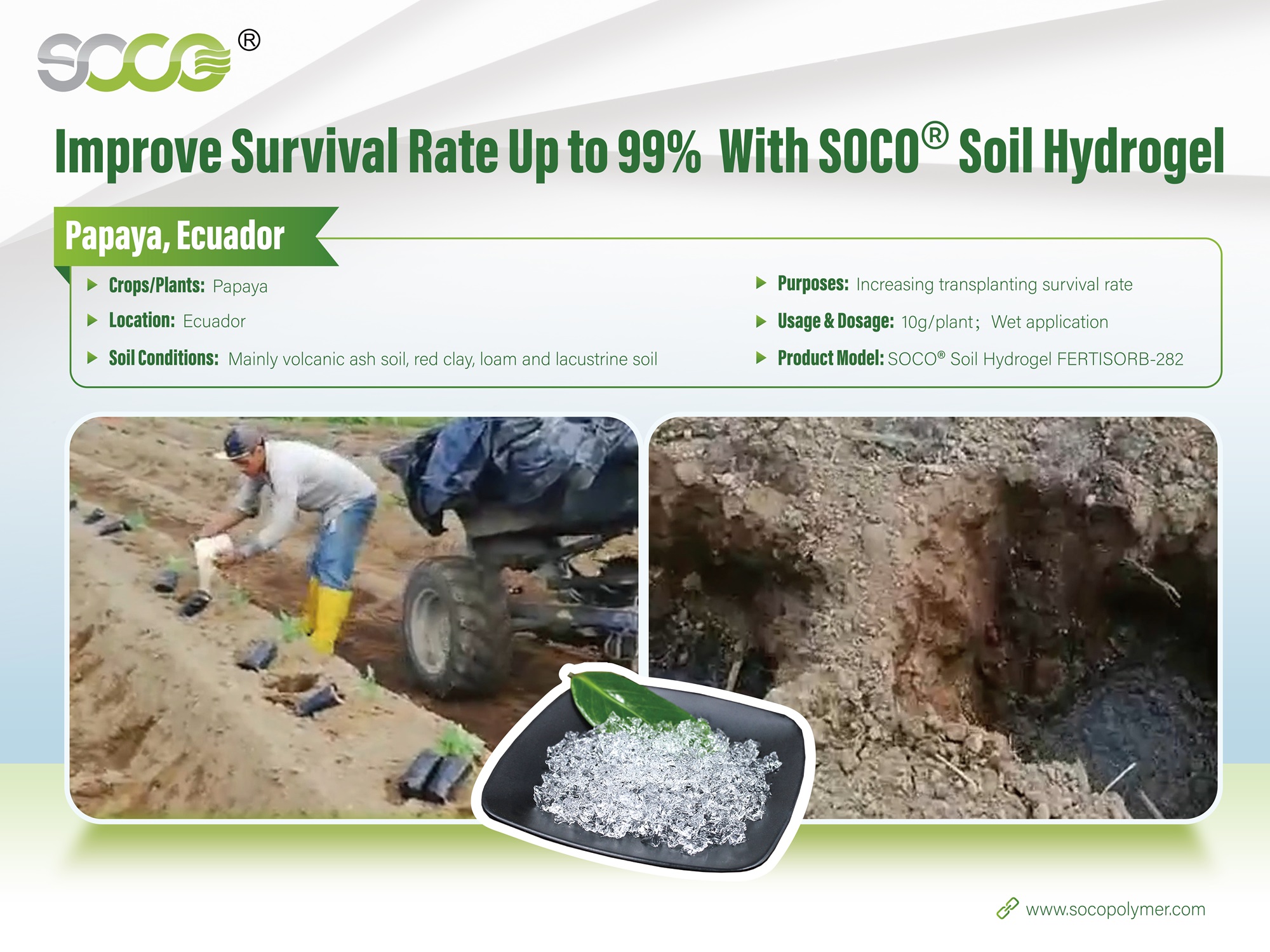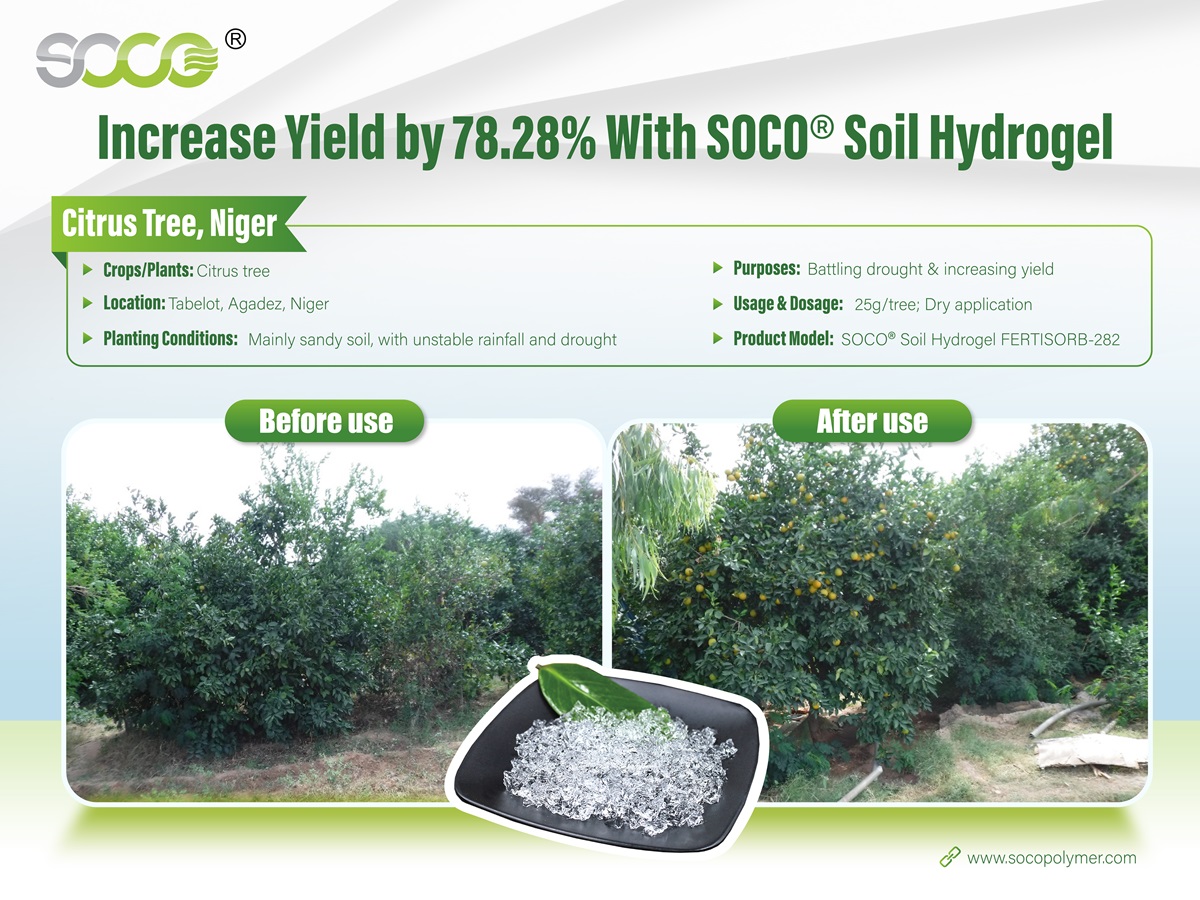With the continuous enhancement of global environmental awareness and the deepening of the concept of sustainable development, various industries are seeking greener and more environmentally friendly innovative solutions. In the field of agriculture, Super Absorbent Polymer (SAP) has emerged as a new material, especially in fruit tree planting and soil moisture retention. SOCO Super Absorbent Polymer (SAP), with its excellent water absorption capacity and environmental friendliness, is becoming one of the key technologies in agricultural production. This article will delve into the important applications of Super Absorbent Polymers in modern agriculture, particularly their enormous potential in increasing fruit tree yields and soil moisture retention.
Super Absorbent Polymers (SAP), as the name suggests, are polymers with extremely hydrophilic groups that can absorb water dozens, hundreds, or even thousands of times their weight. The most common SAP material is petroleum-based polyacrylate (PAA), which has a high ionic density (COO-) and the ability to form long polymer chains, allowing it to efficiently absorb water and remain stable under various environmental conditions. However, with the global trend of reducing carbon emissions and promoting environmentally friendly solutions, the SAP market is seeking more sustainable materials.
In response to the global call for environmental protection, the industry is gradually turning its attention to biodegradable super absorbent polymers. These super absorbent polymers not only naturally degrade after use but also reduce environmental pollution, aligning with the requirements of green production and sustainable development. It is expected that by 2024, the global Super Absorbent Polymer market will grow by 5.7% year-on-year, indicating its enormous potential in the fields of environmental protection and agriculture.
The application of Super Absorbent Polymers in agriculture has made significant progress, especially in fruit tree planting, where SAP shows great potential. Using SAP in agricultural production not only conserves water but also improves the growth rate and yield of crops, particularly in areas experiencing drought or water scarcity.


In fruit tree planting, SAP is generally applied to the soil, significantly improving soil moisture retention. Particularly during the pre-flowering period of fruit trees (e.g., early May), applying SAP can provide moisture retention for two growth cycles. This means SAP can effectively alleviate soil drought issues, ensuring that fruit trees receive sufficient water during critical growth stages.
After applying SAP, the moisture in the soil can be more effectively stored and released when needed by the fruit trees, thus promoting their growth. The increased available moisture provides adequate conditions for the trees' photosynthesis, thereby improving their transpiration rate and stomatal conductance, which are crucial for healthy growth.
SAP not only has advantages in water retention but also significantly enhances the growth speed of fruits. Studies have shown that after applying SAP, the single fruit weight and quality of fruits improve significantly. This is because SAP effectively improves the growing environment of fruit trees, increasing photosynthesis efficiency. As the application amount increases, fruit yields also show an upward trend.
Significant analysis indicates that compared with fruit trees without SAP, those with SAP application show notable improvements in soil moisture, fruit growth speed, and yield. This suggests that SAP has a remarkable effect on increasing fruit yields, providing sustainable potential for boosting production in fruit tree planting.
As a leading Super Absorbent Polymer brand, SOCO Super Absorbent Polymers (SAP) is committed to providing more environmentally friendly and efficient solutions for global agriculture. By offering excellent water retention capacity, SOCO SAP not only achieves efficient moisture management in the soil but also helps farmers reduce irrigation water and improve crop yields and quality.
SOCO SAP's innovation is not only reflected in its efficient water absorption but also its biodegradable properties. By adopting environmentally friendly materials, SOCO SAP ensures the effectiveness of agricultural production while reducing negative environmental impacts. As a biodegradable product, SOCO SAP reduces agricultural waste and soil pollution, meeting the requirements of modern green agricultural production.
Besides fruit trees, SOCO SAP has also achieved significant results in other crops. Whether in the crop, vegetable planting, or flower cultivation, the application of SOCO SAP demonstrates its strong adaptability and effects. By integrating with modern agricultural technologies, SOCO SAP helps farmers achieve precise irrigation and moisture management, promoting agriculture in a more efficient, intelligent, and environmentally friendly direction.
As the world increasingly emphasizes sustainable agriculture and environmentally friendly production models, SAP technology is gradually becoming an essential part of modern agriculture. SOCO Super Absorbent Polymers (SAP), with their powerful moisture management capabilities, environmental friendliness, and broad application prospects, are becoming pioneers in agricultural transformation. In the future, with continuous innovation and popularization of SAP technology, agriculture will become more efficient, green, and sustainable, contributing positively to global food security and environmental protection. By adopting SOCO SAP, farmers can not only improve crop yields and quality but also contribute to environmental goals, water conservation, and emission reduction, driving agriculture towards a more sustainable and intelligent direction.